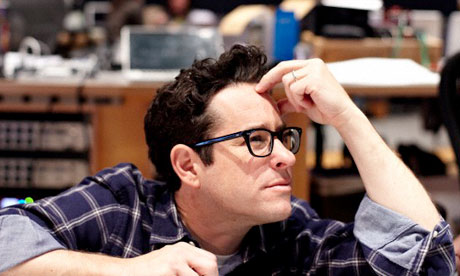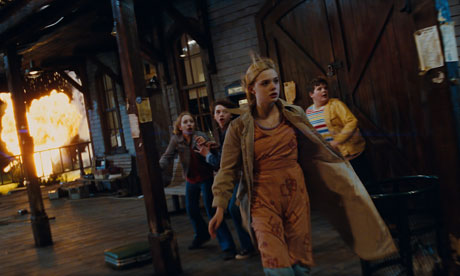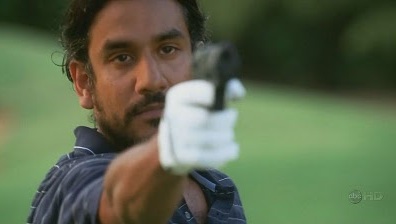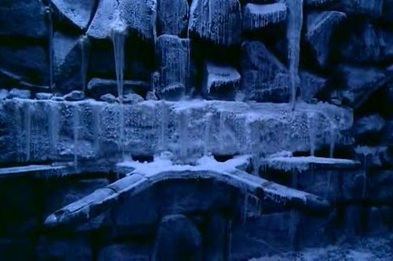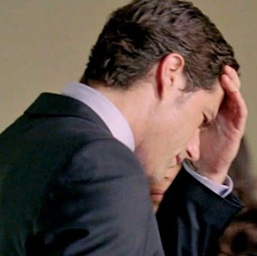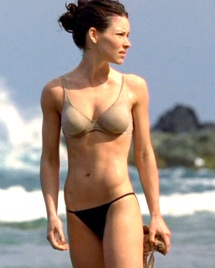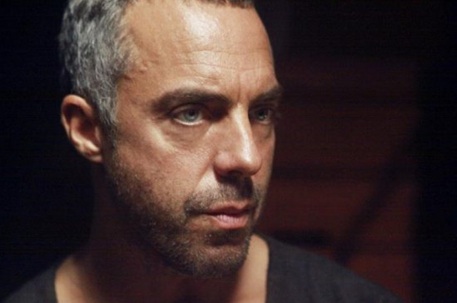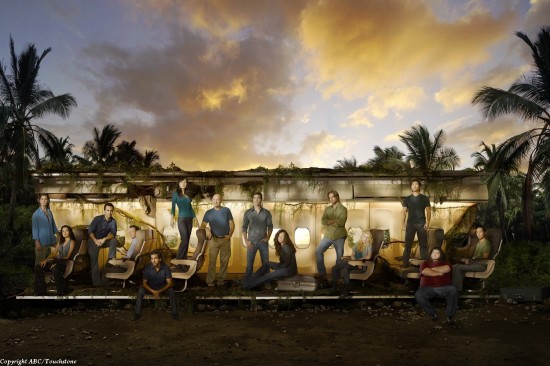What to Expect From Fringe Season 4: "The show has a meaning that we haven’t shared yet"

Fringe returns for a miraculous fourth season next month, and we'll finally get to discover just what kind of world(s) our characters are living in now.
When we got a chance to talk to the producers and stars, they promised huge surprises and twists. But the producers also promised that we'll start to discover just what Fringe really means, something that we haven't gotten to see yet.
Spoilers, including some pretty big hints for season four, ahead.
We were lucky enough to sit down with all of the Fringe stars, plus producers J.H. Wyman and Jeff Pinkner, for roundtable interviews at San Diego Comic-Con. And what they told us renewed our excitement and curiosity for the show's upcoming fourth season.
The big question hanging over Fringe, of course, is what happens if season four is the final season? The show already has a full-year commitment, and Fox has made it clear the show just has to hold its audience steady to be considered a success. But there's always the possibility that the producers won't get another few years to finish telling their story. Are we going to get the ending to Fringe that they've always said they had in mind?
Wyman says the studio and the network have been totally transparent with him and Pinkner. When the show moved from Tuesdays to Thursdays, and then from Thursdays to Fridays, the network always shared its goals with the producers. At the same time, "it's an expensive canvas," and if they don't get enough viewers, the network won't let them keep painting on it.
Adds Wyman:
The show itself has a meaning to us that we haven't shared yet. We feel confident that that meaning is going to get across. And that really is all we want, as success. To be able to ask questions but give answers, and have people feel satisfied. Because I would want that... If worst comes to worst, and we couldn't do anything, we always joked that we would do comic books, so people could do the story. We'll come up with something. Or a little hand-puppet show. [Laughs] But we feel confident that we're going to be able to tell enough story to make people satisfied.
Says Pinkner, "We know where the show ends. We're fans and we know what it's like to invest time in something and, all of a sudden it's like, 'Wait, that's it?' And that wasn't the creator's intention." And he stresses that they're telling a story about characters, rather than plot mechanics, and they've always known where they want the characters to end up.
"Science fiction is a really neat way to talk about the human condition," says Wyman. "We're always trying to investigate what it's like to be a human right now, in 2011." These questions are not really the same as, "What's going to happen to the Island" on Lost. It's more like, 'I care about these people. What does this show mean? How is it going to end?' It's scary because we do have a lot of seasons in us, you know. But it's okay. If it doesn't happen, then we'll try and finish, and make people satisfied."
And meanwhile, the producers promised huge reveals and twists this season. "We enjoy consequences, so we'll have many surprises along the way," says Pinkner.
I asked the producers whether the revelation in the season finale about the nature of the First People was going to stick. And they said, basically, yes. Pinkner explained:
We know that the First People were Walter. But we have a rule in that we never say we're done with anything. At one people thought we were "done" with Charlie, and we kept saying, 'No, no, no,' and nobody trusted us. And then Leonard retired, and then here he is back again. And we were getting cancelled — we're not done there either. But as far as the First People being a mystery? Yes. Mystery solved.
And when the show comes back, we'll see a new element introduced — one which will "dimensionalize the show," says Wyman. This new element, which they wouldn't reveal, will make the new status quo clear to the audience, and "You'll go, 'Oh.'" The producers are "always trying to recontextualize" with each new season, so that you're not viewing it the same way as you did before. And they hinted that relations between the two universes will not be without tension, now that they're linked together.
So what's the deal with Peter?
What on Earths is up with Peter Bishop? "We ended the season saying he doesn't exist and the characters don't remember him," says Pinkner. Obviously, Joshua Jackson is still on the show, say the producers. And the questions of what's happened to Peter, "will Peter return and how, and what will be the consequences of that," will dominate. "We like to set mysteries but then answer them quickly, and then play the 'And then what?', as opposed to hinging everything on an answer that we're then pushing down the line."And when Pinkner was listing the mysteries about Peter, he seemed to be on the verge of including "Who Joshua Jackson is playing," but then he stopped himself.
We asked Jackson himself about this, and he said he wished Pinkner had finished that sentence — because Jackson himself doesn't know what's going on, even though they'd already filmed one episode at that point. "I wish they would have finished that sentence. I wish they would have told you, and then you could have let me in." (Watch the video at left, which was shot at another roundtable in the same room, to see Jackson discussing the possibility that Peter might be an Observer, as was hinted by the video at the show's panel.)
But Jackson does have one major clue to offer us: "Everything we knew at the end of season three is still valid, without Peter."
But without Peter in the picture, "everybody's life is quite different," said Blair Brown (Nina Sharp). "A lot of things in their lives are different, because the timeline is changed." And Brown says that for people who've never seen the show, this could be a great starting point, because it's like a fresh reboot. For people who've been watching all along, there'll be extra layers — but for new viewers, it'll all make sense. "It's really quite clever."
"I'm really excited to see how important Peter was to these people's lives, in all these small, tiny ways," adds Jasika Nicole (Astrid Farnsworth). "We take for granted how important it is to have someone in your life, all these years. And then suddenly they're not there any more, and in fact they were never there."In particular, the backstory of Walter Bishop becomes very different. In the original timeline, Peter comes and gets Walter out of the mental institution in the show's pilot. But with no Peter, things played out very differently — instead, Olivia got Walter out. And Walter actor John Noble told us that "if Olivia took Walter from the hospital years ago, she would still be under a condition of approval. He needs her."
"[Olivia] and Walter have this arrangement that has been made," says Nicole. "Walter is so very different, because he did not transition out of the institution into real life, and so because of that, he's really, really weird this season — even more so than he has been before, which I thought wasn't possible. But it's really sad. It's funny, but it's really sad... It's like he's institutionalized himself, in a way."
And the fact that this crucial part of Walter's backstory — Peter getting Walter out of the institution — didn't happen means that there's a missing piece in these characters' past. "Particularly for Olivia and Walter, there's a chunk missing," says Brown. "And they don't know what it is."
Noble shared the theory he's been expounding in other places lately about what happened to Peter in this new timeline. It's not that he never existed, it's that he died of his illness as a child, instead of being cured.
Meanwhile, we were wondering if Joshua Jackson felt as though Peter Bishop had already achieved his destiny by stepping into the machine, and he felt like that was true:Yeah. I feel like the character progression from the Peter we introduced at the beginning of the pilot is finished by the end of season three. So [we're] sketching either an aftermath, like a postscript, to that story, or we're having to draw an entirely new — not an entirely new character, but something new has to come out of it. You can chart this for each one of the characters, but their stories are still going. But for Peter — when we introduced him, the guy who cares about nothing, has no roots anywhere, and keeps no friends close to himself and lives this nihilistic life where it's all about him. To go forward three years, and to have that same guy decide first to get into the machine — which he really didn't want to do — but to decide this is my fate, my destiny, that's a major progress. And [second] to get to the future, and have that experience, and basically decide to conspire with his own father and make himself not exist, so that the people he loves will have a chance to live — that is a very noble sacrifice, and it is not anything that the guy three years ago would even have considered doing. So yeah, to me, that is a period, full-stop on Peter.
What else to expect
The new timeline means that Astrid is no longer Walter's caretaker — she's out in the field instead, with a gun and a briefcase! This is something that actor Jasika Nicole has been wanting for a long time, and "I'm really excited about that." And there's another really cool thing about Astrid, which Nicole didn't want to give away yet. "It's a great big step, and I'm hoping at some point she will be chasing after people in her heels, and pulling out her gun," she laughs. But she says it feels weird not to be in the lab with Walter.
Meanwhile, Seth Gabel says the Lincoln Lee we see first in season four will be the one from "our" universe — the Lincoln with the glasses, who "does not know his own power, and does not know the Fringe team yet."
"When I imagine what this season would be about, I sort of imagine two universes being forced to face one another without fear," says Gabel, and try to make peace. And simultaneously, maybe we'll see Peter struggling to come back from wherever he's gone, in some "in-between" place outside of reality. But Gabel stresses he doesn't know anything, and this is just his imagining.
Says Lance Reddick: "I'd like to see Primary Broyles [and] see more of what's happened in his personal life," now that everybody's past is different. We know that Broyles still loves his ex-wife, but he's been forced to move on, but maybe things are different now. And he'd like to see more of Broyles' past with the government and the military. '
Reddick would also like to learn more about the Observers, and what dimension they live in, and where they come from. It appears that "they're outside the whole multiverse," so it could be fascinating to learn more about that.
"Maybe they have a connection to where Peter is, and our future selves," adds Gabel.
Also, Torv and Noble talked a lot about the challenge of playing alternate versions of their characters throughout season three. Noble felt very strongly that the alternate versions needed to be humanized:We knew going in that because the audiences had come to like us, they would treat [our] enemies as bad people. That's kind of the nature of humanity…we kept asking the writers to humanize these people so the audience weren't sure who to root for.
Added Torv:
Never judge a character, because as an actor, you're taught to always fight their cause. The alternate Olivia isn't bad at all, and Walternate has a completely justifiable reason for doing what he does.
Torv said it was really interesting to play a different version of her character, after a couple of years, and get a different perspective on Olivia. And she worked extra hard during the whole "Fauxlivia/Olivia" switch — on the one hand, the audience needed to be able to tell that Fauxlivia was pretending to be Olivia, but on the other hand, it couldn't be so obvious that the audience would wonder why nobody saw through the charade.
Noble seemed excited at the idea of playing a whole new version of Walter this season: "Anything that doesn't freeze the characters in time" is a good move, he told reporters. If the show's characters don't keep growing and changing, "I think we would cease to be as enthusiastic about them as we are.

 Fringe returns for a miraculous fourth season next month, and we'll finally get to discover just what kind of world(s) our characters are living in now.
Fringe returns for a miraculous fourth season next month, and we'll finally get to discover just what kind of world(s) our characters are living in now.
 We asked Jackson himself about this, and he said he wished Pinkner had finished that sentence — because Jackson himself doesn't know what's going on, even though they'd already filmed one episode at that point. "I wish they would have finished that sentence. I wish they would have told you, and then you could have let me in." (Watch the video at left, which was shot at another roundtable in the same room, to see Jackson discussing the possibility that Peter might be an Observer, as was hinted by
We asked Jackson himself about this, and he said he wished Pinkner had finished that sentence — because Jackson himself doesn't know what's going on, even though they'd already filmed one episode at that point. "I wish they would have finished that sentence. I wish they would have told you, and then you could have let me in." (Watch the video at left, which was shot at another roundtable in the same room, to see Jackson discussing the possibility that Peter might be an Observer, as was hinted by 


